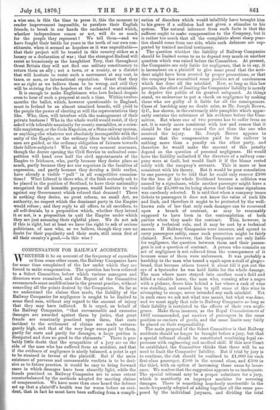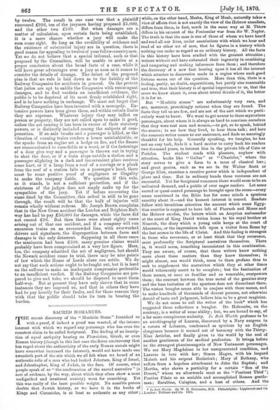COMPENSATION FOR RAILWAY ACCIDENTS.
WHETHER it be on account of the frequency of casualties or from some other cause, the Railway Companies have for some time complained of the law under which they arc forced to make compensation. The question has been referred to a Select Committee, before which various managers and directors were examined, and the Report of the Committee recommends some modifications in the present practice, without conceding all the points desired by the Companies. So far as we understand the claims thus made, the liability of the Railway Companies for negligence is sought to be limited to some fixed sum, without any regard to the amount of injury that they may have inflicted. It is urged, on behalf of the Railway Companies, "that unreasonable and excessive damages are awarded against them by juries, that great frauds are constantly practised upon them, that costs incident to the settlement of claims are made extrava- gantly high, and that of the very large sums paid by them, partly for costs and partly for damages, a large portion is dissipated and does no good to the claimants." There is pro- bably little doubt that the sympathies of a jury are on the side of the man who has suffered from an accident, and that if the evidence of negligence is nicely balanced, a point is apt to be strained in favour of the plaintiff. But if the mere existence of perverse and unreasonable verdicts is to be deci- sive as to future practice, it would be easy to bring forward cases in which damages have been absurdly light, while the frauds practised on Railway Companies are to some extent counterbalanced by the methods adopted for meeting claims of compensation. We have more than once heard the defence set up that a plaintiff's health was far worse before an acci- dent, that in fact he must have been suffering from a compli-
cation of disorders which would infallibly have brought him to his grave if a collision had not given a stimulus to his system. The natural inference from such facts is that the sufferer ought to make compensation to the Company, but it is rather too much that all the complaints about sharp prac- tice should come from one side, while such defences are sup- ported by trained medical testimony.
The question whether the liability of Railway Companies should be limited seems to us to depend very much on another question which was raised before the Committee. At present, the Companies are only liable for negligence, that is to say, it is incumbent on a plaintiff to give some proof that the acci- dent might have been averted by proper precautions, or that the company has committed some positive act of carelessness which has done all the mischief. Now, so long as this law prevails, the effect of limiting the Companies' liability is merely to deprive the public of its greatest safeguard. As things stand, we endeavour to put a check on negligence by making those who are guilty of it liable for all the consequences. Cases of hardship may no doubt arise, as Mr. Joseph Brown, Q.C., has shown, in the extremely able pamphlet which appar- ently contains the substance of his evidence before the Com- mittee. But where one of two persons has to suffer from an act, it is surely more consistent with law and reason that it should be the one who caused the act than the one who received the injury. Mr. Joseph Brown appears to assume that the compensation paid to the sufferer is nothing more than a penalty on the other party, and therefore he would make the amount of this penalty depend on the question of personal negligence. He would have the liability unlimited if the directors of a railway com- pany were at fault, but would limit it if the blame rested solely with the company's servants. This is more or less consistent with his theory. But it would be poor consolation to one passenger to be told that he could only recover £100 for the loss of his whole livelihood because a collision was caused by a signalman, while another passenger might have a verdict for £5,000 on its being shown that the same signalman was carelessly selected. It is said that when a company issues tickets to passengers it does not know the value of each life and limb, and therefore it ought to be protected by the well- known rule of law that only such damages can be recovered upon a breach of contract, as may be reasonably supposed to have been in the contemplation of both
parties when they made the contract. This, however, is merely a technical rule, and it may be met by a technical answer. If Railway Companies were insurers, and agreed to carry passengers safely, some such protection might be fairly claimed. Now, however, that the Companies are only liable for negligence, the question between them and their passen- gers is not a question of contract. A person who commits an act of negligence is not relieved from the consequences of it because some of them were unforeseen. It was probably a hardship to the man who tossed a squib upon a stall of ginger- bread, that because others tossed it about till it put out the eye of a bystander he was held liable for the whole damage. The man whose mare strayed into another man's field and killed a valuable horse, the man who, running after a negro with a pickaxe, drove him behind a bar where a cask of wine was standing, and caused him to spill some of this wine in attempting to escape, never intended any such mischief. Yet in such cases we ask not what was meant, but what was done, and we must apply that rule to Railway Companies so long as their liability is restricted to the effects of their own negli- gence. Make them insurers, 'as the Royal Commissioners of 1867 recommended, put carriers of passengers in the same position as carriers of goods, and the same limits may fairly be placed on their responsibility.
The main proposal of the Select Committee is that Railway accidents should no longer be brought before a jury, but that a special tribunal should be constituted combining legal ex- perience with engineering and medical skill. If this new Court be established, the Committee thinks that there will be no need to limit the Companies' liability. But if trial by jury is to continue, the risk should be confined to £1,000 for each first-class passenger, £500 in the second class, and £300 in the third, with an option of increasing those sums by insur- ance. We confess that the suggestion appears to us inadequate. The special tribunal may be a proper substitute for a jury, which is manifestly an improper machine for assessing damages. There is something hopelessly unscientific in the mode frequently adopted of adding together all the sums pro- posed by the individual jurymen, and dividing the total
by twelve. The result in one case was that a plaintiff recovered £916, ten of the jurymen having proposed £1,000, and the other two £500. But when damages are a matter of calculation, upon certain facts being established, it is a mere chance whether a jury will make the sum come right. So long as the credibility of evidence and the existence of substantial injury are in question, there is good reason for appealing to twelve of your fellow-countrymen. Yet we do not believe that a special tribunal, such as that proposed by the Committee, will be unable to arrive at a proper conclusion about the broad facts of a ease, while it will have great advantages over a jury as soon as it comes to consider the details of damage. The defect of the proposed plan is that no rule is laid down as to the liability of the Railway Companies for accidents in general. On the pretext that juries are apt to saddle the Companies with extravagant damages, and to find verdicts on insufficient evidence, the public is to be deprived of its most firmly established right, and is to have nothing in exchange. We must not forget that Railway Companies have been invested with a monopoly. Ex- tensive powers have been given them, and within certain limits they are supreme. Whatever injury they may inflict on person or property, they are not called upon to make it good, unless the act causing it has been in excess of their statutory powers, or is distinctly included among the subjects of com- pensation. If an axle breaks and a passenger is killed, or the vibration of running trains renders a house uninhabitable, or the sparks from an engine set a hedge on fire, and the flames are communicated to corn-fields or a wood, or if the fastenings of a door give way and a passenger is thrown out in trying to shut the door, or if a train stops outside a station and a passenger alighting in a dark and inconvenient place receives some hurt, or if a lamp from a roof of a carriage or a plank from the roof of a station falls on a passenger's head, there must be some positive proof of negligence or illegality to make the company liable, We question if this rule, as it stands, is not a sufficient protection, and if the strictness of the judges does not amply make up for the sympathies of the jury. Yet if before recovering the sums fixed by the Committee, this ordeal is still to be gone through, the result will be that the bulk of injuries will remain wholly without redress. Mr. Joseph Brown complains that in the New Cross accident the London and Brighton Rail- way has had to pay £50,000 for damages, while the fares did not exceed £16. But then there were about eighty cases arising out of that one accident, and if a company will run .excursion trains on an overcrowded line, with overworked drivers and signalmen, the disproportion between fares and damages is the only deterrent. Supposing in all these cases the maximum had been £300, many genuine claims would probably have been compromised at a very low figure. Here, too, the company admitted the act of negligence, but should the Newark accident come to trial, there may be nice points of law which the House of Lords alone can settle. We do not say that such actions ought to be fought out, but it is hard on the sufferer to make an inadequate compromise preferable to an insufficient verdict. If the Railway Companies are pre- pared to give and take, we should be disposed to meet them half-way. But at present they have only shown that in some instances they are imposed on, and that in others they have had to pay heavily for their faults, and for those reasons they wish that the public should take its turn in bearing the burden.































 Previous page
Previous page